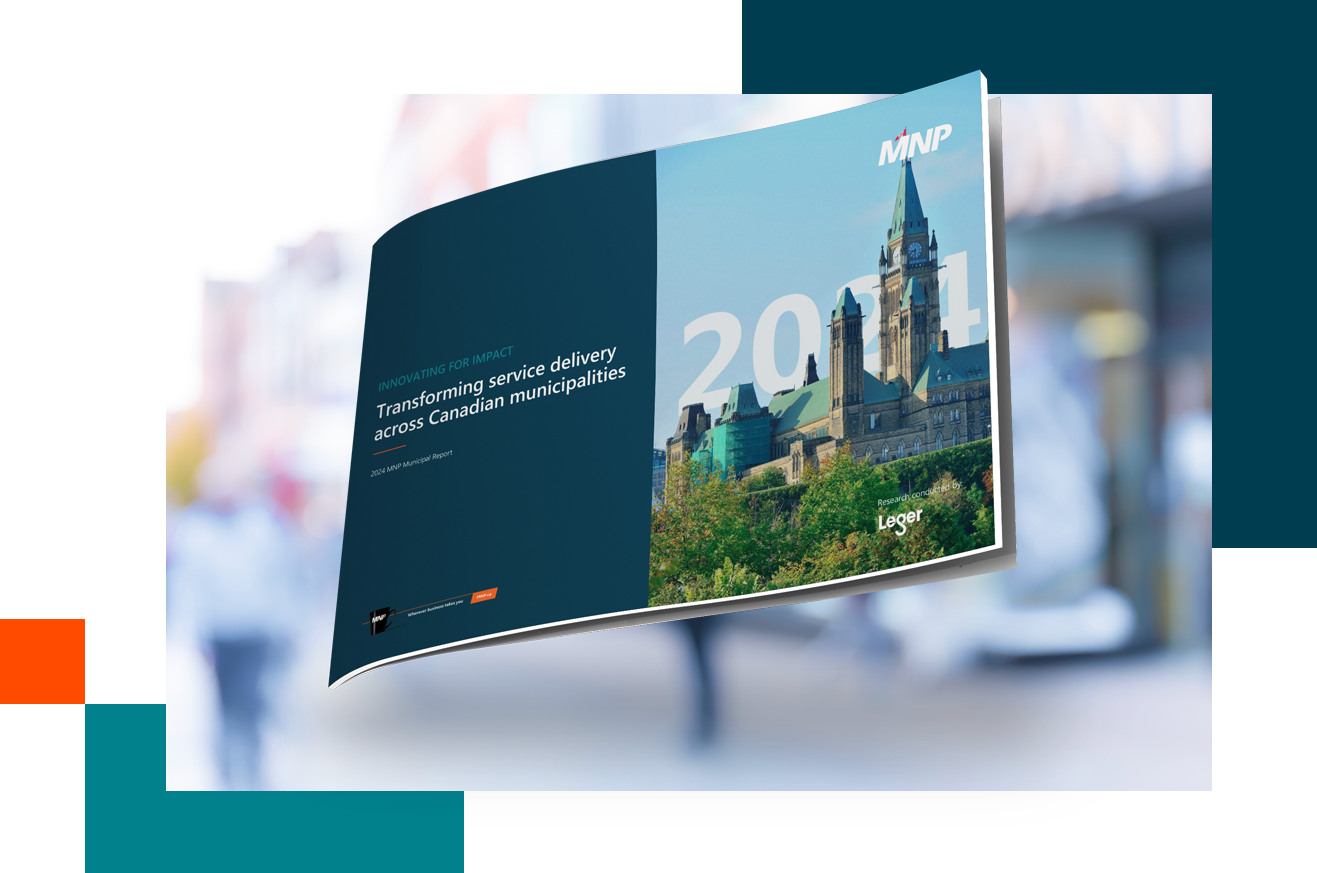Latest study from MNP and Leger reveals the successes, trends, and roadblocks to transforming service delivery in Canadian municipalities.
Calgary, Alberta — June 11, 2024 — Seventy-two percent of Canadian local government leaders say improving their customer experience is a top priority over the next three to five years, according to MNP’s latest survey on local government transformation in Canada. This staggering 12-point increase from a similar study in 2023 highlights the rapidly growing demand for convenient self-serve digital services — and the challenges for local governments to deliver.
“Users have grown accustomed to a seamless user experience where they can get almost everything they need at the click of a button,” says James Richardson, a Consulting Partner with MNP. “Our research shows that local governments understand these expectations and are taking steps to meet them. Still, the road ahead won’t be easy, with limited funding, competing priorities, and a wide range of user needs to consider.
What are the barriers to transformation?
Survey respondents said budgetary constraints (65%) and resource capacity (51%) are the most significant roadblocks to introducing new/improved customer service technologies. Many also cited resistance to change (49%) and data privacy and security concerns (45%) as potential barriers to the integration of emerging capabilities like artificial intelligence (AI).
Moreover, while 80 percent of local governments surveyed say customer service is a strategic focus for their council or leadership, only 46 percent define their customer consistently across all departments and services. The study identified 17 unique customer groups among the responses, ranging from residents and website users to builders, developers, businesses, neighbouring local governments, and media, among others.
“Municipalities are increasingly looking to make technology more accessible and responsive to the needs of stakeholders in their communities,” says Wendy Gnenz, a Partner with MNP Digital. “The challenge is that local governments are multifaceted and what works for one organization may not work for another. For example, digital transformation not only needs to be affordable and sustainable, but it must also be secure and instill confidence that data is being protected.
How are local governments prioritizing the customer experience?
Local governments share several common objectives for improving their customer experience, with the MNP study highlighting a particular desire for:
- continuous improvement (59%)
- capturing customer feedback and insights (58%), and
- understanding how customer needs and expectations are evolving (53%)
Technology will play a foundational role in achieving these goals, with nearly six in 10 (59%) saying they have already used customer feedback and survey tools to capture customer feedback. Forty-seven percent have also launched a self-service portal and/or a mobile application (43%) to improve access to services.
Many have also noted plans to implement or enhance their existing suite of digital tools and resources. While only one in 10 local governments currently use AI-powered chatbots (11%), a striking 30 percent plan to either implement one or enhance their existing capabilities within the next five years. More than a quarter also have plans to introduce or improve live chat capabilities (28%), online service portals (27%), or mobile apps (26%).
“The vast majority of local governments already have strong digital foundations like websites, email, and social media in place,” says Gnenz. “Unfortunately, that’s both a blessing and a curse because very few plan to enhance those technologies within the next five years. Budgets are tight and new capabilities aren’t always compatible with legacy systems. New technologies also bring new security and privacy concerns to consider.”
What else is standing in the way of transformation?
As a strategic priority, cyber security/privacy remains the top anticipated technology challenge over the next five years (65%).
Only a slight majority of local governments consider themselves somewhat prepared (57%) to deal with emerging cyber and privacy threats. Nearly a quarter say they’re either not very prepared (19%) or not at all prepared (4%).
Most local governments are also concerned about the need to replace legacy systems (56%) and the challenges of finding and retaining talent to manage an increasingly sophisticated network of digital tools (53%). Unsurprisingly, more than half cite a lack of resources (56%) as a barrier to their organization’s success. A growing number also say existing policies and procedures (45%, up 21 pts from 2023), and regulatory requirements (41%, up 28 pts from 2023) are significant barriers to their ability to deliver timely and relevant customer service.
“Compared to our survey last year, significantly more respondents have said red tape, regulatory complexity, organization structures, and misalignment with council and/or leadership are major concerns,” says Richardson. “Likely, this is because more local governments have begun pursuing digital transformation and revitalization initiatives. They’re discovering that the process is not just about adopting new platforms and solutions. It’s forcing them to think outside the box and reassess deeply engrained beliefs and processes.”
About the survey
In an effort to gain and share valuable local government insights, MNP, in partnership with Leger, conducted research on local governments’ approach and innovation for service delivery across Canada. A total of 297 survey responses were completed between March 11, 2024, and April 12, 2024, by local governments, including municipalities, regions, regional districts, towns, summer villages, counties, and other special districts from various regions across the nation, all over the nation. The survey focused on understanding the top focus areas, barriers, considerations, benefits, and challenges associated with customer service-enhancing technologies.
About MNP LLP
National in scope and local in focus, MNP is one of Canada’s leading professional services firms — proudly serving individuals, businesses, and organizations since 1958. Through the development of strong relationships, we provide client-focused accounting, consulting, tax, and digital services. Our clients benefit from personalized strategies with a local perspective to fuel success wherever business takes them. For more information, visit www.mnp.ca.
For additional information, please contact:
Wendy Gnenz, Partner, MNP Digital, at 780.733.8605 or [email protected]
James Richardson, Partner, MNP, at 780.919.2060 or [email protected]
